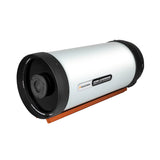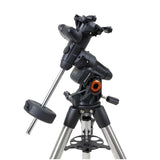
The first task on my agenda is to acquire my deep sky astroimaging gear. One of the advantages of working for Celestron is that I can borrow display equipment as long as our marketing or engineering teams do not need it for events or testing. After consulting with Celestron's top master imager, I've decided to begin with this setup:
 Celestron 8" Rowe-Ackermann Schmidt |
 Celestron Advanced VX Mount and Tripod |
 Counterweight, 11 lb for 19mm Shaft |
 Sky-Watcher Evoguide 50DX Apo |
 ZWO ASI183MC Pro Cooled Color CMOS |
 ZWO ASI290MM Mini (mono) Camera for Guiding |
 Starizona Filter Slider - RASA 8 ZWO Cooled |
 Optolong L-Pro Filter 2" Mounted |
 Celestron Ha-Hb-OIII Imaging Filter RASA 8 |
 PowerTank Lithium Pro |
 PowerTank Lithium |
 Aluminum Dew Shield with Cover Cap - 8" |
|
Lenovo ThinkPad Laptop with free imaging |
USB 3.0 Cable
|
Undoubtedly, my setup will evolve. While I could include even more accessories now, I'd rather start with a simpler setup and decide on any additional accessories later.
The most important part of my astroimaging rig is a stable yet portable mount. The Advanced VX is a perfect choice. With a maximum load capacity of 30 lb, it can easily handle the weight of the RASA 8 (17 lb) plus accessories, a guidescope, and an autoguider—all while accurately tracking celestial targets. The Advanced VX mount also includes an autoguider port. Best of all, it's compact enough that I can bring it outside at a moment's notice or load it into my compact car for dark sky trips.
The imagers I spoke with all recommended the RASA 8 because of its ability to capture spectacular, wide-field deep sky images in seconds with its super-fast f/2.0 optical system! How appealing is that? RASA 8 is also versatile—filters can be added to capture detail in faint objects—even in my light-polluted suburban skies. Keep in mind that the RASA optical system cannot be used for visual observing and is strictly an astroimaging instrument. Because the prime focus focal plane is at the front of the optical system, there is no place for a traditional eyepiece.
The ZWOASI183MC Pro Cooled Color CMOS Camera was another easy choice due to its affordable cost, high sensitivity, and excellent reputation for achieving superb results in color when paired with the RASA 8.
Perhaps the most important accessory I'll use is the Starizona Filter Slider for RASA 8. Although it's not compatible with Celestron's RASA 8 46mm (1.81") filters (those can be added to the RASA 8's integrated filter mount at the front of the scope), it allows me to use other manufacturer's 2" filters, such as Optolong's 2" L-Pro filter. The Filter Slider's depth provides the extra back spacing required for images to reach focus.
I already own a Celestron PowerTank Lithium Pro and PowerTank Lithium, which provide enough power to the mount and camera for a night's imaging session, so I'll be covered there.
I live behind a bright parking lot, so I'll need a dew shield will be necessary to help block stray light and keep my optics clear and dry. The Aluminum Dew Shield's lens cap blocks all light from entering the tube, which will be helpful when I need to capture dark frames. (But I'll leave that for another post.)
With summer already upon us, my goal is to take detailed images of many of the brighter and more popular celestial delights such as the Lagoon Nebula (M8), Trifid Nebula (M20), Sagittarius Star Cluster (M22), Dumbbell Nebula (M27), Witch's Broom (NGC 6960), and more! I know some astroimagers will shoot a particular object for hours, but I'll be happy seeing colorful images appearing on my laptop screen using shorter exposures. I want to establish myself, learn the basic imaging techniques, and enjoy the hobby. I will have plenty of time to see where astroimaging will take me in the future—especially once I'm retired. Like many works of art, astroimages vary from person to person. I'm excited to see my results, knowing they'll be uniquely my own. It's time to embark on my treasure hunt. Until the next blog entry, clear skies!
